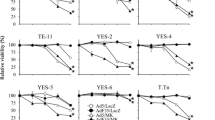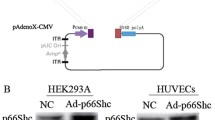Abstract
Objective: In most laryngeal cancers, the function of p53 gene is down regulated. To explore the potential use of p53 in gene therapy of laryngeal cancer, by introducing wild-type p53 into laryngeal cancer cell line via a recombinant adenoviral vector, Ad5CMV-p53 and analyzing its effects on cell and tumor growth. Methods: A human laryngeal cancer, cell line Hep-2 was used. Recombinant cytomegalovirus-promoted adenoviruses containing human wild-type p53 cDNA was transiently introduced into Hep-2 line. The growth suppression of the Hep-2 cells and established s.c. squamous, carcinoma model was examined. The p53 protein expression was detected using immunohistochemical analysis. Results: The transduction efficiencies of Hep-2 cell line were 100% at a multiplicity of 100 or greater. The p53 protein expression peaked on day 2 after infection and lasted far 5 days. In vitro growth assays revealed cell death following Ad5CMV-p53 infected. In vivo studies, Ad5CMV-p53 inhibited the tumorigenicity of Hep-2 cell, and in nude mice with established s.c. squamous, carcinoma, nodules showed that tumor volumes were significantly reduced in mice that received peritumoral infiltration of Ad5CMV-p53. Conclusion: Adenovirus-mediated antitumor therapy carrying the p53 gene is an efficient method to inhibit laryngeal cancer growth. Transfection of laryngeal cancer cells with the wild-type p53 gene via Ad5CMV-p53 is a potential novel approach to the therapy of laryngeal cancer.
Similar content being viewed by others
References
Barinaga M. From bench top to bedside. Science 1997; 278:1036.
Soussi T, Legros Y, Lubin R, et al. Multifactorial analysis of p53 alteration in human cancer: A review. Int J Cancer 1994; 57:1.
Zhang WW, Fang X, Mazur W, et al. High-efficiency gene transfer and high-level expression of wild-type p53 in human lung cancer cells mediated by recombinant adenovirus. Cancer Gene Therapy 1994; 1:5.
Graham FL, Prevec L. Methods for construction of adenovirus vectors. Molecular Biotechnology 1995; 3:207.
Hamada K, Zhang WW, Aleminy R, et al. Growth inhibition of human cervical cancer cells with the recombinant adenovirus p53 in vitro. Gynecologic Oncology 1996; 60:373.
Fujiwara T, Grimm EA, Mukhopadhyay T, et al. Induction of chemosensitivity in human lung cancer cells in vivo by adenovirus-mediated transfer of the wild-type p53 gene. Cancer Res 1994; 54:2287.
Liu TJ, Zhang WW, Taylor DL, et al. Growth suppression of human head and neck cancer cells by the introduction of a wild-type p53 gene via a recombinant adenovirus. Cancer Res 1994; 54:3644.
Zhang WW, Alemany R, Wang J, et al. Safety evaluation of Ad5CMV-p53 in vitro and in vivo. Human Gene Therapy 1995; 6:155.
Merritt JA, Clayman G, Schwisher S, et al. Clinical gene therapy strategies: phase I/II results with adenoviral p53 (INGN 201) gene transfer in advanced head and neck and non-small cell lung cancers. Cancer Gene Therapy 1997; 4:330.
Author information
Authors and Affiliations
Corresponding author
Additional information
This work was supported by the grand from National Natural Foundation of China (No. 39570758).
Rights and permissions
About this article
Cite this article
Qi, W., Zu-ze, W., De-min, H. et al. Growth inhibition of human laryngeal cancer cell with the adenovirus-mediated p53 gene. Chin. J. Cancer Res. 11, 157–160 (1999). https://doi.org/10.1007/s11670-999-0001-3
Accepted:
Issue Date:
DOI: https://doi.org/10.1007/s11670-999-0001-3




